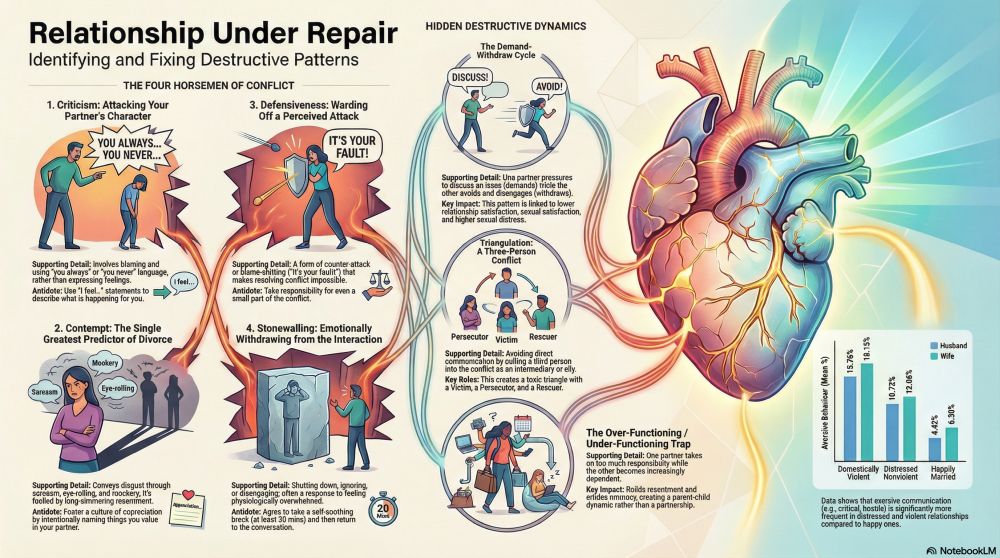Terminal Decline in Relationships
Interactive visualization of relationship satisfaction patterns and warning signs before breakup
Terminal Decline: Two-Phase Pattern
Hover over the lines to see satisfaction levels. Note the gradual preterminal phase (mild decline) followed by the sharp terminal phase (rapid drop).
Preterminal Phase (1-2 years)
Mild, gradual decline in satisfaction. Couples still engaged but experiencing growing distance.
Terminal Phase (7 months before breakup)
Sharp, steep drop in happiness. Emotional exhaustion, no repair attempts, psychological exit begins.
Warning Signs Timeline
Hover over the points to see when different indicators appear and their severity.
💡 Key Takeaway
Terminal decline is common but not inevitable. Early recognition of the preterminal phase (7-27 months before potential breakup) offers the best window for intervention. If you notice: declining satisfaction, no repair attempts, chronic conflict, or emotional exhaustion—act now through counseling, intentional connection, and addressing core issues.
Gradual Decline in Relationship Satisfaction Over Years (Terminal Decline)
- Key Finding: Relationship satisfaction typically declines slowly over 1–2 years before a breakup, followed by a rapid drop leading to separation. This two-phase pattern is called terminal decline and is consistent across cultures and relationship types.
- Details:
- The preterminal phase involves a mild, steady decrease in satisfaction.
- The terminal phase is marked by a sharp, steep decline in happiness and connection.
- The transition point between these phases occurs 7 months to 2.3 years before breakup.
- Breakup initiators enter this decline earlier, while recipients experience a steeper drop closer to the breakup.
Emotional and Behavioural Signs of Disengagement
- Lack of Effort and Energy: Couples stop fighting not because issues are resolved, but because they lack the energy or motivation to try. This represents emotional exhaustion and disengagement.
- Absence of Repair Attempts: Partners stop initiating conversations or efforts to mend the relationship, signalling a withdrawal from investment in the partnership.
- Fantasy of Freedom: One or both partners begin daydreaming about life without the relationship’s constraints or emotional burdens, indicating a psychological distancing.
- Loss of Positive Illusions: The common bias to see the partner’s good qualities fades, replaced by a more negative or indifferent view.
Increased Conflict and Reduced Support
- Conflict Frequency and Intensity: Higher levels of unresolved conflict and negative interactions predict relationship dissolution. Chronic fighting without resolution erodes the relationship foundation.
- Reduced Support and Intimacy: Declines in emotional support, affection, and intimacy are strong predictors that a relationship is ending.
Breaches of Trust and Incompatibility
- Trust Violations: Infidelity, dishonesty, or repeated betrayals significantly increase the likelihood of breakup.
- Incompatibility: Fundamental differences in values, life goals, or personality that cannot be reconciled often lead to relationship termination.
- Unsatisfying Sex Life: Persistent sexual dissatisfaction is a common reason couples report for ending relationships.
Psychological and Contextual Predictors
- Individual Mental Health: Higher levels of internalising symptoms (e.g., depression, anxiety), externalising behaviours, and substance use increase breakup risk.
- Stressful Life Events: Accumulation of external stressors (financial, family, work) can accelerate relationship dissolution.
- Low Romantic Appeal: Feeling unattractive or unappealing to one’s partner correlates with earlier relationship endings.
Cognitive and Emotional Processing of Breakup
- Understanding Reasons for Breakup: Individuals who gain clarity about why the relationship ended show better mental health and improved future relationship competence.
- Control Over Breakup Initiation: Those who initiate breakups tend to have better psychological adjustment post-breakup than those who are left.
Cultural Universality and Variations
- The terminal decline pattern has been observed across multiple countries and cultures, indicating a universal trajectory for failing relationships.
- However, cultural norms influence how conflict, communication, and emotional expression manifest, which can affect how signs are perceived and acted upon.
Summary Table of Signs That a Relationship Has Run Its Course
| Domain | Specific Signs | Typical Timing | What It Predicts | Immediate Action |
|---|---|---|---|---|
| Satisfaction Trajectory | 1–2 year gradual decline, then sharp drop | 7–27 months pre-breakup | High breakup likelihood | Seek early intervention; track weekly satisfaction |
| Engagement/Effort | No repair attempts, “too tired to try” | Late preterminal → terminal | Withdrawal/disengagement | Schedule repair conversations; set small commitments |
| Conflict | Frequent unresolved fights; negativity spikes | Throughout decline | Erosion of bond | Adopt timeouts, use “I”-language, try brief counselling |
| Support/Intimacy | Less affection, emotional availability, sex | Mid → late decline | Attachment insecurity, distancing | Plan intentional connection; discuss needs explicitly |
| Trust | Infidelity, secrecy, repeated lies | Variable; often late | Breakup risk unless repaired | Full disclosure, boundaries, specialised therapy |
| Values/Goals Fit | Irreconcilable differences (kids, money, lifestyle) | Any stage | Chronic gridlock | Structured negotiation; if immovable, plan separation kindly |
| Mental Health/Stress | Untreated depression/anxiety; substance use; major stress | Any stage | Accelerated decline | Prioritise individual treatment; reduce external stressors |
| Cognition | Fantasy of freedom; loss of positive illusions | Terminal phase | Psychological exit | Clarify reasons; decide to repair or exit with integrity |
Bottom line: terminal decline is common but not inevitable. If you recognise these patterns early and act—by restoring repair attempts, addressing trust, and reducing external stress—trajectory reversals are possible. If core incompatibilities or repeated betrayals persist, a planned, respectful separation may be the healthiest outcome.


